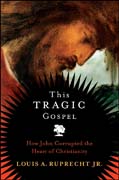
This tragic Gospel: how John corrupted the heart of christianity
Ruprecht, Louis A.
This Tragic Gospel suggests that the "Gospel" of John intended to supplant the first three gospels and succeeded in gaining undue influence on the early churches. This study focuses on the tragic moment when Jesus prays?for deliverance from his impending death in the garden of Gethsemane. Ruprecht contends that John rewrote this scene in order to convey a very different dramatic meaningfrom the one reflected in Mark's gospel. In John's version, not only did Jesus not pray to be spared, he actually mocked this prayer, embracing his imminent demise with godlike confidence. Ruprecht believes that this dramatic reinterpretation undermined the tragedy of Jesus's death as Mark imagined it and so paved the way for the development of a kind of Christianity that focused far less on compassion in the face of human suffering. John's Jesus offers the faithful food so that they will never hunger, water so that they will never thirst,and the promise of a world in which no faithful person ever sheds a tear. Mark's Christians do suffer, but they witness to suffering and death differently... With compassion. Mark's Christ suffers, like all Christians after him, but he embodies a tragic hope in the promise of a faith shored up by love and compassion. Despite the subtitle of this book, which some general readers may find alarming, Ruprecht's argument is well reasoned and reflects concerns not new to scholars and Bible translators. The author, who teaches religious studies at Georgia State University, places in juxtaposition the gospels of Mark and John, suggesting that John was written not to supplement Mark's book, but rather to replace it and create a more strident, less human portrait of Jesus. Ruprecht dissects the two gospels and shows how the Johannine influence has prevailed in Christian history, in particular with reformers like Martin Luther. He also explores how John's gospel may have fed into the centuries-old plague of anti-Semitism in the church and beyond. In contrast to the self-assured Jesus described in John, Mark's Jesus is conflicted and ambiguous, working miracles but commanding those he healed not to tell anyone. And where (in Ruprecht's view) Mark sees Jesus' suffering as without purpose, in John suffering was itself thepurpose. Although Ruprecht's ideas may surprise and discomfit nonspecialists,they deserve a read and are accessibly presented. (Aug. 8) (Publishers Weekly, April 28, 2008). Louis A. Ruprecht Jr. holds the William M. Suttles Chair in Religious Studies at Georgia State University and is an active member of the American Academy of Religion, the Society for Biblical Literature, the Woodrow Wilson Foundation, and the Society for Values in Higher Education. INDICE: Acknowledgments. Introduction. 1. In the Beginning…: The Modern Quest for Christian Origins. 2. The Heart of Christian Compassion: The Prayer inGethsemane. 3. Mark's Tragic Gospel: The Birth of a Christian Genre. 4. From Tragedy to Triumph: John Against Mark. 5. Secret Caves and Secret Teachings: The Shaping of Christian Orthodoxy. 6. Martin Luther and the Beloved Disciple: How the Gospel Turned Evangelical. Epilogue. Notes. Selected Bibliography. About the Author. Index.
- ISBN: 978-0-7879-8778-7
- Editorial: Jossey Bass
- Encuadernacion: Cartoné
- Páginas: 320
- Fecha Publicación: 07/11/2008
- Nº Volúmenes: 1
- Idioma: Inglés
